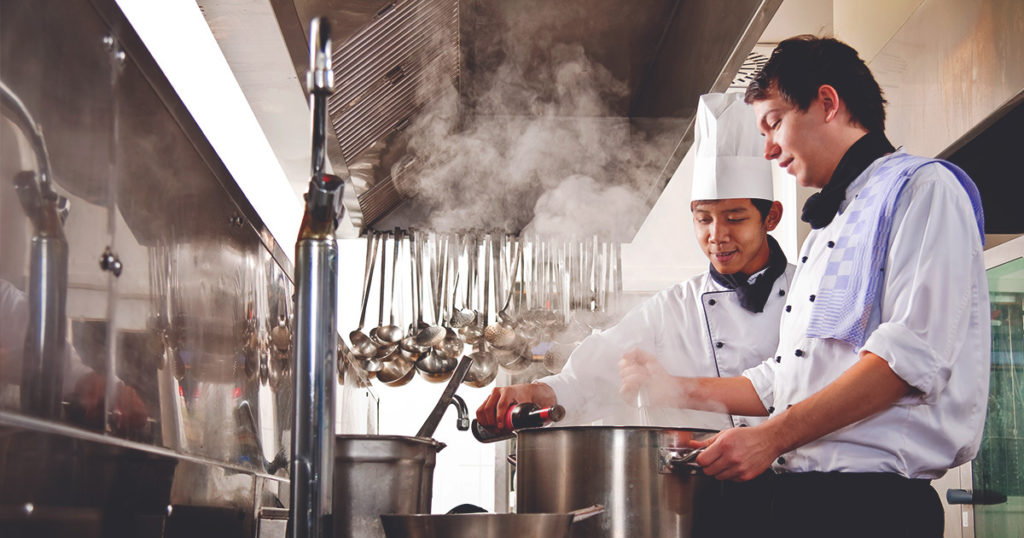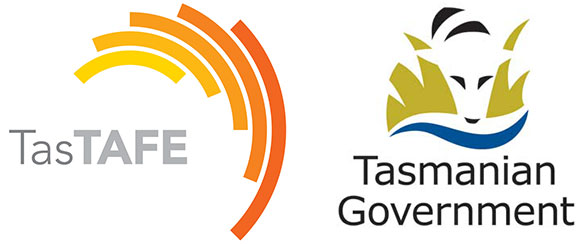Given Australia has such an exciting food scene, there is a lot of work available here for skilled and qualified chefs. If being a chef aligns with your career goals, it could also be your pathway to migrating to Australia, as the occupation is included in the Department of Home Affairs’ skilled occupation list.
A chef is different from a cook. A chef is trained to understand flavours, cooking techniques and create recipes from scratch, and has a high level of responsibility in the kitchen. A cook follows recipes to prepare food. (Note that this occupation is also on the skilled occupation list.)
If you’re keen to become a chef but aren’t sure where to start, we interviewed a graduate and current student who are pursuing careers in cookery.
The first is TasTAFE alumni, Tim Tseng from Taiwan, who completed his Commercial Cookery program in 2020 and is now working as a chef in Oryza – In The Hanging Garden located in Hobart, Tasmania.
We also spoke to Koko Ke, who is from China and currently pursuing a Certificate III in Commercial Cookery at TasTAFE while working part-time at a local restaurant in Hobart.
Both interviewees have a great love for cooking and have shared their journey on how to become a chef in Australia. Let’s get started!
It’s never too late to kick off your career
Before studying to be a chef, Tim was in the military as a radar controller for eight years. After retiring from the military, he decided to come to Australia to improve his English. It was while living in Sydney for two years that he discovered his interest in professional cookery.
He had also heard that Tasmania was home to the freshest ingredients – in many cases, they’re delivered directly from the farm to the restaurant. Moreover, he found immense joy in watching people enjoy his food and decided to pursue a Diploma of Hospitality Management (Commercial Cookery) Pathway Package, which included Certificates III and IV, at TasTAFE.
Koko majored in advertising at university and worked as a content creator at an advertising company in Shanghai for nearly three years. She wrote creative content for various global brands before being employed as a planning manager by one of the six industrial groups in Suning Holdings Group (also one of the Fortune 500 companies).
Koko came to Australia in June 2019 on a working holiday visa and ended up working at a farm in Tasmania. There, she was reminded of one of her favourite chef’s sayings: “The best mise en place* starts at the farm.” In other words, one must value the quality of ingredients, as they will influence the final flavour of the dish. Tasmania was the perfect place for that, Koko thought.
*Mise en place is a culinary process in which ingredients are prepared and organised before cooking.
So, if you decide to have a career change, you can start your journey to becoming a chef at any point, the way Tim and Koko did.
Passion is an important ingredient when cooking
Koko’s favourite quote is by Alain Chapel, a French Michelin-starred chef credited with pioneering nouvelle cuisine: “You have to love either what you are going to eat, or the person you are cooking for. Then you have to give yourself up to cooking. Cuisine is an act of love.”
She chose to pursue cooking because she likes to cook, create and challenge herself. “Cooking for others has been my way of making friends and expressing love,” says Koko.
For Tim, his grandfather (who was also a chef in Taiwan) was a key inspiration. “He told me that no matter what I do, I must always do my best and make it perfect,” Tim says.
Whether it was doing his homework or service in the Main Kitchen and training restaurant for students, Tim always put in maximum effort and passion.
Choose a course that teaches you everything
The Commercial Cookery course at TasTAFE, which both Tim and Koko completed, was very comprehensive. It covered all aspects of working in a kitchen, with big and small responsibilities included. Tim and Koko agree that learning all kinds of skills is important if you want to succeed in the field of cookery.
“You will have to start from the bottom and learn everything in and about the kitchen, including washing dishes. Be humble and take every chance you can so you can learn and gain new experiences,” Tim says.
Besides going to school four days a week, Koko spends a lot of time in the training kitchen preparing and cooking different ingredients and dishes, including vegetables, grains, poultry, seafood, meat and desserts. Students work in a team, but also independently. They are trained to cook dishes from various cuisines around the world.
“What I enjoy most is the cafeteria service, where we get to cook different curry dishes, such as red pork curry, beef rendang, green fish curry and chicken rogan josh,” she says. “Because these dishes are very popular, they are sold out almost every day, and that makes me happy. [I love] cooking different cuisines and seeing people enjoy the diverse foods.”
Say yes to work placements and part-time jobs
The TasTAFE Commercial Cookery courses include an industry-based work placement, which means students will be job-ready after graduation.
Tim enjoyed doing service in the Main Kitchen, as well as his experience during the work placement.
When he cooked in the Main Kitchen, he was selected to be Head Chef by his lecturer in the first week. He learned a lot, from organising the roster and communicating with his team, to checking the inventory and ordering ingredients.
Tim’s work placement was at MONA during the Dark Mofo festival in 2018, which for him was the best chance to connect with the industry.
“I think these two real-life learning experiences were most memorable while I was studying at TasTAFE,” he says. “I felt so proud and was glad to join Dark Mofo, as all of MONA’s chefs inspired me a lot.”
It was while studying at TasTAFE that Tim accumulated his kitchen experience and found the confidence to apply to Oryza when the restaurant was looking to hire new staff.
Any hospitality experience is worthwhile when it comes to boosting your employability. Be open to working part-time at a restaurant while you’re studying to gain skills beyond your course.
What to do if you want to get started
If you’d like to get started on your cooking journey, Koko recommends contacting the Tasmanian Government Education and Training International (GETI), which manages international enrolments for TasTAFE, and inquiring about the courses on offer.
Eventually, Koko wants to combine cooking and creativity to produce food that tastes and looks phenomenal. She is interested in creative food photography and also has her own YouTube channel where she shares the dishes she has cooked at school. “I hope I can share more videos and pictures of food on social media in the future,” she says.
Tim’s plans for the future include bringing Taiwanese cuisine to Australia, by establishing his own restaurant where he will create new dishes for people to delight in.






